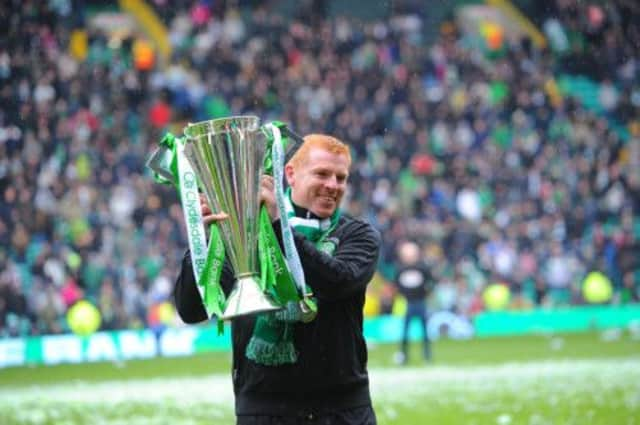Stephen Halliday: Lennon’s ambition may outgrow Celtic’s arena


Having enjoyed his second successive SPL trophy presentation at the weekend, the Celtic manager will be regarded as a shoo-in to make it three and four in a row over the next two seasons in the continued absence of the traditional challenge posed by Rangers.
Even if the fallen Ibrox club do complete their currently projected journey back to the top flight in the summer of 2015, it is difficult to predict with any confidence if they will constitute the kind of opposition immediately capable of renewing the previously established Old Firm duopoly of the Scottish game.
Advertisement
Hide AdAdvertisement
Hide AdSo while Lennon was correct to say that the almost mystical notion of ‘ten in a row’ is “a long way off”, there can be little doubt Celtic have never been better placed to exert an unprecedented monopoly of being domestic champions.
Such is the solid infrastructure and financial stability of the Parkhead club, they are operating from a position of strength which could take Rangers several years to even come close to matching.
Yet it is perhaps that most promising of landscapes which stretches out from a Celtic supporter’s perspective that paradoxically leaves Lennon with a dilemma as his name becomes increasingly linked with a move to the English Premier League. A fiercely ambitious character, there may be a limit to the personal satisfaction he can gain from working in Celtic’s current environment.
Lennon is acutely aware of how poorly Scottish football is perceived south of the Border. It is both an irritant and a frustration for the 41-year-old who spent the first half of his playing career in English football.
During Celtic’s memorable Champions League campaign this season, Lennon freely made himself available to the English media. The regular appearances on TalkSport, 5live and Football Focus have all been undertaken with a keen awareness of how crucial they were to widening appreciation of both his own and Celtic’s achievements on the continental stage.
But Champions League participation is far from guaranteed for Celtic. Although they will be seeded in all three qualifying rounds they must play next season, it could take just one awkward draw, off-colour performance or controversial refereeing decision to see them miss out on the lucrative group stage. Without that, no amount of domestic success will earn Lennon any additional brownie points in England or any of the other nations where he admits his long-term managerial ambitions lie. So if the opportunity to move to Everton were to present itself over the next few weeks, Lennon would clearly have to make the biggest decision yet of his career.
For two of his mentors, Martin O’Neill and Gordon Strachan, life after managing Celtic has proved less than stellar in recent seasons as their reputations have suffered in English football. Yet it remains the most alluring of workplaces for British managers, both in terms of personal finance and prestige.
What it most certainly will not afford Lennon, unless he turns out to be the next Alex Ferguson, is the opportunity he currently has to build a one-man trophy-laden dynasty at a club. It is how he feels others perceive the merit of his success at Celtic that may yet determine how long his Parkhead tenure lasts.
First Scots to lift FA cup at Wembley for 16 years
Advertisement
Hide AdAdvertisement
Hide AdThere was a time, not so very long ago, when it was something of a rarity for a team to win the FA Cup final without the services of at least one Scottish player in their ranks.
Sadly, like so many other comforting certainties that were once taken for granted during Scottish football’s golden years, this country’s influence on England’s showpiece occasion has diminished steadily and significantly in the past decade.
So it was heartening to see a tartan tinge once again to events at Wembley on Saturday as James McArthur and Shaun Maloney both played pivotal roles in Wigan Athletic’s admirable and thoroughly merited triumph against odds-on favourites Manchester City.
The Scottish international duo, along with unused substitutes Gary Caldwell and Fraser Fyvie, became the first players from north of the Border to collect winners’ medals in the world’s oldest and pre-eminent domestic cup competition since Darren Fletcher helped Manchester United defeat Millwall 3-0 in the 2004 final. Prior to that, Gary McAllister had a substitute’s role when Liverpool beat Arsenal in the 2001 final.
Fletcher and McAllister both earned their medals during the occasion’s relocation to Cardiff while Wembley was under renovation. Remarkably, that means the Wigan quartet are the first Scots to triumph under what used to be the twin towers for 16 years, since current West Bromwich Albion manager Steve Clarke was part of the Chelsea side that defeated Middlesbrough 2-0 in the 1997 final. For Maloney, who missed out on all of the five Scottish Cup successes Celtic enjoyed during his time at the club, Saturday must have been especially gratifying as his sweetly delivered corner kick set up Ben Watson’s dramatic late winner.
The 30-year-old has arguably been in the form of his life this year and, for Scotland’s sake, has hopefully done enough to remain a Premier League player next season, whether with Wigan or through a move elsewhere.